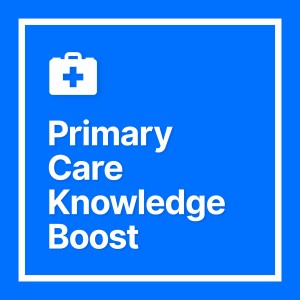Primary Care Knowledge Boost
peri-menopause
Episodes

Wednesday Jun 21, 2023
Wednesday Jun 21, 2023
Doctors Lisa and Sara speak with Dr Uma Marthi who is a GP with a Specialist Interest in Gynaecology about red flags for gynaecological cancers. We discuss some cases based on real patients that involve cervical, vaginal and endometrial cancers. We’ll be recording a separate episode around the varied presentations of Ovarian cancer.
You can use these podcasts as part of your CPD - we don’t do certificates but they still count :)
Useful resources:
NICE guidelines for Red Flags for Gynaecological Cancers (Updated Dec 2021): https://www.nice.org.uk/guidance/ng12/chapter/Recommendations-organised-by-site-of-cancer#gynaecological-cancers
Cancer Research UK: https://www.cancerresearchuk.org/about-cancer/
Jo’s Trust for Cervical Cancer: https://www.jostrust.org.uk/
The Eve Appeal: UK Charity funding research and raising awareness of the five gynaecological cancers – womb, ovarian, cervical, vulval and vaginal: https://eveappeal.org.uk/
Go Girls: UK Charity Supporting Women with Gynaecological Cancers: https://www.gogirlssupport.org/
BMJ Research Article: Prevalence of cervical disease at age 20 after immunisation with bivalent HPV vaccine at age 12-13 in Scotland: retrospective population study (April 2019): https://www.bmj.com/content/365/bmj.l1161
___
We really want to make these episodes relevant and helpful: if you have any questions or want any particular areas covered then contact us on Twitter @PCKBpodcast, or leave a comment on our really quick anonymous survey here: https://pckb.org/feedback
___
This podcast has been made with the support of GP Excellence and Wigan CCG. Given that it is recorded with Greater Manchester clinicians, the information discussed may not be applicable elsewhere and it is important to consult local guidelines before making any treatment decisions.
The information presented is the personal opinion of the healthcare professional interviewed and might not be representative to all clinicians. It is based on their interpretation of current best practice and guidelines when the episode was recorded. Guidelines can change; To the best of our knowledge the information in this episode is up to date as of it’s release but it is the listeners responsibility to review the information and make sure it is still up to date when they listen.
Dr Lisa Adams, Dr Sara MacDermott and their interviewees are not liable for any advice, investigations, course of treatment, diagnosis or any other information, services or products listeners might pursue as a result of listening to this podcast - it is the clinicians responsibility to appraise the information given and review local and national guidelines before making treatment decisions. Reliance on information provided in this podcast is solely at the listeners risk.
The podcast is designed to be used by trained healthcare professionals for education only. We do not recommend these for patients or the general public and they are not to be used as a method of diagnosis, opinion, treatment or medical advice for the general public. Do not delay seeking medical advice based on the information contained in this podcast. If you have questions regarding your health or feel you may have a medical condition then promptly seek the opinion of a trained healthcare professional.

Wednesday Apr 27, 2022
Wednesday Apr 27, 2022
This is another episode with a focus on Urology. Doctors Lisa and Sara invited Professor Ian Pearce back to speak about overactive bladder and urinary incontinence in women. They discuss the types of lower urinary tract symptoms in women (drilling down into the definitions of commonly used terms), before looking at the red flags to consider. They then use fictional cases to illustrate how to approach overactive bladder and incontinence in terms of assessment, investigation and management options.
Useful resources:
NICE CKS: Urinary incontinence in women: https://cks.nice.org.uk/topics/incontinence-urinary-in-women/
GMMMG Guidelines for assessment and treatment of overactive bladder in adults: https://gmmmg.nhs.uk/wp-content/uploads/2021/08/Management-of-OAB-in-adults-v3-0-approved-Aug-2019.pdf
Conservative management tips: Bladder and Bowel Community UK: https://www.bladderandbowel.org/bladder/bladder-treatments/urinary-tract-infection-treatments/
Guidelines in Practice: Top tips: urinary incontinence in women: https://www.guidelinesinpractice.co.uk/urology/top-tips-urinary-incontinence-in-women/455577.article
Anticholinergic Burden resource 2: Anticholinergic Burden Calculator: http://www.acbcalc.com/
___
We really want to make these episodes relevant and helpful: if you have any questions or want any particular areas covered then contact us on Twitter @PCKBpodcast, or leave a comment on our really quick anonymous survey here: https://pckb.org/feedback
____
This podcast has been made with the support of Greater Manchester Health and Social Care Partnership, GP Excellence, Greater Manchester Training Hub and the GP Fellowship Programme, as well as Wigan Borough CCG. Given that it is recorded with Greater Manchester clinicians, the information discussed may not be applicable elsewhere and it is important to consult local guidelines before making any treatment decisions.
The information presented is the personal opinion of the healthcare professional interviewed and might not be representative to all clinicians. It is based on their interpretation of current best practice and guidelines when the episode was recorded. Guidelines can change; To the best of our knowledge the information in this episode is up to date as of it’s release but it is the listeners responsibility to review the information and make sure it is still up to date when they listen.
Dr Lisa Adams, Dr Sara MacDermott and their interviewees are not liable for any advice, investigations, course of treatment, diagnosis or any other information, services or products listeners might pursue as a result of listening to this podcast - it is the clinicians responsibility to appraise the information given and review local and national guidelines before making treatment decisions. Reliance on information provided in this podcast is solely at the listeners risk.
The podcast is designed to be used by trained healthcare professionals for education only. We do not recommend these for patients or the general public and they are not to be used as a method of diagnosis, opinion, treatment or medical advice for the general public. Do not delay seeking medical advice based on the information contained in this podcast. If you have questions regarding your health or feel you may have a medical condition then promptly seek the opinion of a trained healthcare professional.

Wednesday May 05, 2021
Wednesday May 05, 2021
By popular demand we are delighted to share this talk about managing peri-menopausal symptoms in general practice! Dr Jacquelyn Gatenby joins us to discuss her approach; starting with common symptoms, alternatives to HRT, who she feels we should be offering HRT to, and the pros and cons of HRT. We talk about the contraindications, her process for deciding which type of HRT to give, and where testosterone and contraception fit in.
___
Discussion of the history of studies around the safety of hormone replacement therapy: https://www.womens-health-concern.org/help-and-advice/factsheets/hrt-the-history/
The British Menopause Society: https://thebms.org.uk/
The British Menopause Society Breast Cancer Risks factsheet, Nov 2020 (includes the 2019 Collaborative Group for Hormonal Risk Factors and 2020 long term follow-up of the placebo-controlled, randomised Women’s Health Initiative studies): https://thebms.org.uk/wp-content/uploads/2020/11/12-BMS-TfC-Fast-Facts-HRT-and-Breast-Cancer-Risk-01C.pdf
My Menopause Doctor, resource by Dr Louise Newson (includes link to download the Balance app): https://www.menopausedoctor.co.uk/
NICE Guidelines: Menopause Diagnosis and Management: https://www.nice.org.uk/guidance/ng23
FSRH Clinical Guidelines: Contraception for Women Aged over 40 Years (Aug 2017, amended Sept 2019): https://www.fsrh.org/documents/fsrh-guidance-contraception-for-women-aged-over-40-years-2017/
___
We welcome any feedback you might have, our survey takes 1-2 minutes: pckb.org/feedback or contact us on Twitter @PCKBpodcast
___
This podcast has been made with the support of Greater Manchester Health and Social Care Partnership, GP Excellence and Wigan CCG. Given that it is recorded with Greater Manchester clinicians, the information discussed may not be applicable elsewhere and it is important to consult local guidelines before making any treatment decisions.
The information presented is the personal opinion of the healthcare professional interviewed and might not be representative to all clinicians. It is based on their interpretation of current best practice and guidelines when the episode was recorded. Guidelines can change; To the best of our knowledge the information in this episode is up to date as of it’s release but it is the listeners responsibility to review the information and make sure it is still up to date when they listen.
Dr Lisa Adams, Dr Sara MacDermott and their interviewees are not liable for any advice, investigations, course of treatment, diagnosis or any other information, services or products listeners might pursue as a result of listening to this podcast - it is the clinicians responsibility to appraise the information given and review local and national guidelines before making treatment decisions. Reliance on information provided in this podcast is solely at the listeners risk.
The podcast is designed to be used by trained healthcare professionals for education only. We do not recommend these for patients or the general public and they are not to be used as a method of diagnosis, opinion, treatment or medical advice for the general public. Do not delay seeking medical advice based on the information contained in this podcast. If you have questions regarding your health or feel you may have a medical condition then promptly seek the opinion of a trained healthcare professional.

Wednesday Jul 17, 2019
Wednesday Jul 17, 2019
Lisa and Sara talk to GP Dr Gatenby about contraception.
In this episode we talk about when contraception becomes effective when starting or swapping contraception types, quick starting pills, post-natal/breast feeding considerations for contraception as well as contraception around peri-menopause.
____
Useful resources:
FSRH up to date guidance for all contraception matters: click here
Stockley's interactions checker (requires subscription): click here
____
Have feedback or suggestions? You can help us know how we are doing with our 5 minute survey: click here
____
This podcast has been made with the support of Wigan CCG. Given that they are recorded with Wigan clinicians, the information discussed may not be applicable elsewhere and it is important to consult local guidelines before making any treatment decisions.
The information presented is the personal opinion of the healthcare professional interviewed and might not be representative to all clinicians. It is based on their interpretation of current best practice and guidelines when the episode was recorded. Guidelines can change; To the best of our knowledge the information in this episode is up to date as of it’s release but it is the listeners responsibility to review the information and make sure it is still up to date when they listen.
Dr Lisa Adams, Dr Sara MacDermott and their interviewees are not liable for any advice, investigations, course of treatment, diagnosis or any other information, services or products listeners might pursue as a result of listening to this podcast - it is the clinicians responsibility to appraise the information given and review local and national guidelines before making treatment decisions. Reliance on information provided in this podcast is solely at the listeners risk.
The podcast is designed to be used by trained healthcare professionals for education only. We do not recommend these for patients or the general public and they are not to be used as a method of diagnosis, opinion, treatment or medical advice for the general public. Do not delay seeking medical advice based on the information contained in this podcast. If you have questions regarding your health or feel you may have a medical condition then promptly seek the opinion of a trained healthcare professional.